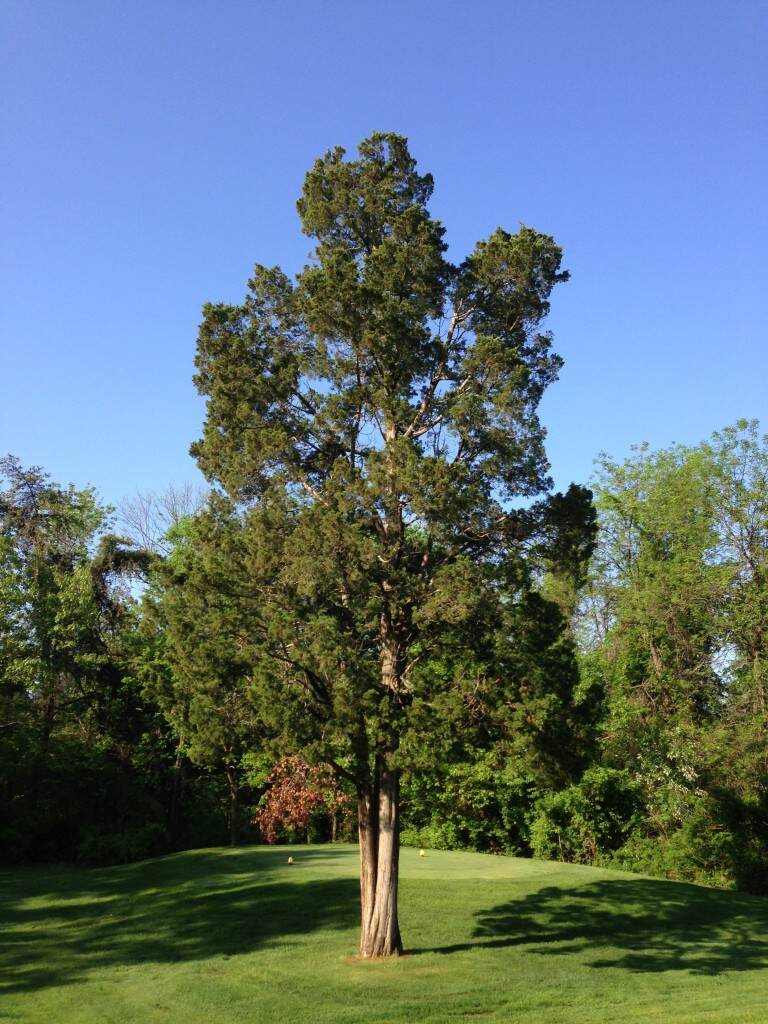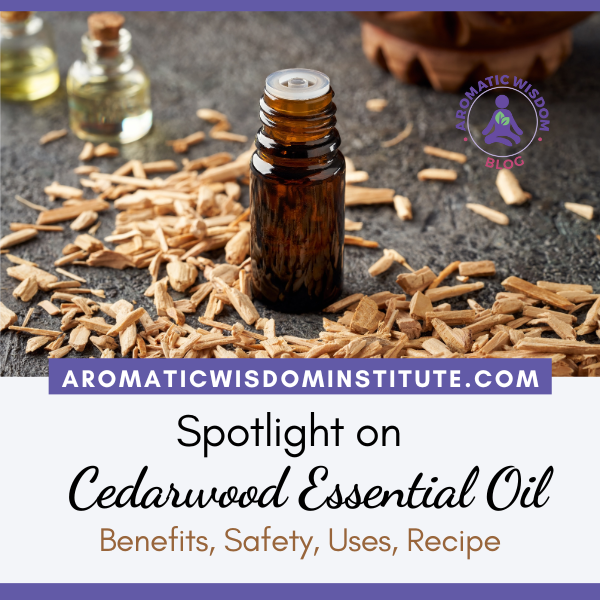Today’s featured essential oil helps with respiratory issues like coughing and excess mucus.
It increases emotional endurance in difficult times
and is fundamental for connecting with earth energies and the base chakra.
Essential Oil of Cedarwood, Virginia
Juniperus virginiana

My personal relationship with Cedarwood Virginia
There are hundreds of cedars in the plant kingdom and I like most of them, but this isn’t my favorite (that honor goes to Cedarwood Atlas, which I’ll write about in a future Fragrant Friday). Nevertheless, this species of cedarwood still has an important place in my aromatic toolbox for helping me ground my clients when they feel overwhelmed with life, or when they have lung issues like bronchitis. I especially love this oil in the diffuser when blended with Sweet Orange and Ylang Ylang. YUM!
Make Sure You’ve Got the Right Cedarwood!
Ask any of my students and they’ll tell you that I am a pain in the butt when it comes to learning Latin binomials. Latin binomials are those impossible-to-pronounce “scientific names” you find under the common name on a bottle of essential oil. They consist of two parts, genus, and species, and are always italicized e.g., Juniperus virginiana. I wrote this blog post on Taxonomy and Nomenclature to help you understand those fancy plant names.
Hundreds of Species of Cedarwood
Why am I bringing this up? Because there are so many genera and species of cedarwood that one could write an entire book on only these trees! According to Tony Burfield in a 2002 article on Cedarwood, commercial cedarwood oils are obtained from three primary genera of Cupressaceae (that’s the plant family that all cedars belong to):
- Juniperus spp. for Texas and Virginian Cedarwood oils
- Cedrus for Moroccan and Indian oils
- Cupressus for Chinese oils
Note: Base
Geographical source: USA
Plant Part: Wood
Oil Characteristics: Exudes an earthy blend of balsamic, sweet, and woody aromas.
Chemical Families: Sesquiterpenes, Sesquiterpenols
Therapeutic Properties of Virginia Cedarwood Essential Oil
- Astringent to help contract and tighten skin tissue
- Calms nervous tension and anxiety
- Reduce mucus from the respiratory system
- Has a diuretic action which can help reduce fluids in the tissue
- Repels moths and insects
Suggested Applications of Virginia Cedarwood Essential Oil
Cedarwood is very effective in treating coughs and respiratory infections. Its astringent and antiseptic qualities make it useful in skin care, especially for acne. It can be nourishing for the hair and can also support the health of the veins and lymph. The aroma of this species of cedarwood is considered a male fragrance, making it great in any blends for men.
- Add to a chest cream to relieve congestion
- Add to any blend that is designed to ground and calm the nerves
- Add to massage oil to soothe an overactive mind
- Use it to bless your money
- Add to unscented incense cones, let dry for about 12 hours then burn for meditation purposes or as an insect repellant
Blends well with Bergamot, Jasmine, and Neroli.
Relaxing Diffuser Recipe with Cedarwood, Virginia
Sit Back and Relax Diffuser Blend
This is a soft, relaxing blend that’s perfect to add to your diffuser during a quiet evening at home with friends or family.
4 drops Cedarwood (Juniperus virginiana) essential oil
3 drops Sweet Orange (Citrus sinensis) essential oil
2 drops Lavender (Lavandula angustifolia) essential oil
(optional: 2 drops of Ylang Ylang (Cananga odorata) in place of Lavender for a more romantic blend)
Cool Mist Diffuser
Subtle Properties (vibrational and energetic): The aroma of Cedarwood clears and cleanses a room allowing for positive energy; connects us with Mother Earth; and promotes a calm, meditative state to better receive healing. I like to use it to bless my money!
The aroma of Cedarwood clears and cleanses a room allowing for positive energy; connects us with Mother Earth; and promotes a calm, meditative state to better receive healing. I like to use it to bless my money!
Fun Facts: This particular Cedarwood (Juniperus virginiana) comes from the Eastern Red Cedar, a soft, red, fine-grained, fragrant, and decay-resistant tree whose timber is often used for fence posts. This is particularly fitting because it is a base note essential oil and excellent for grounding your energy!
Safety Information: Non-toxic. Many sources say to avoid Cedarwood oil during pregnancy, but there is no research to support this caution with Juniperus virginiana. It’s probably due to so many different types of Cedarwood trees.





